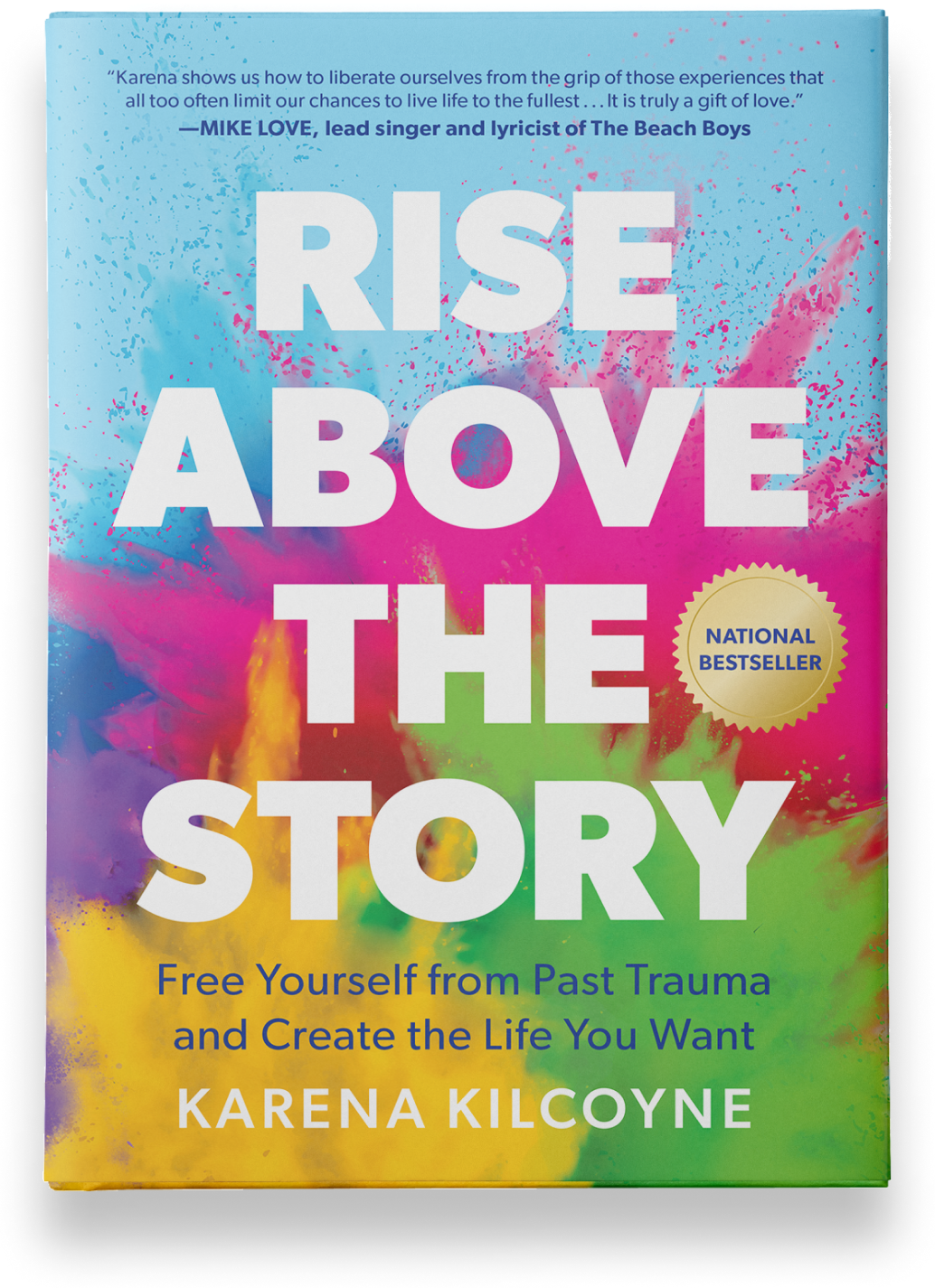Feb 28, 2023

Get your FREE Rise Above the Story Acknowledgement Guide.
Sign up for my newsletter and get your FREE guide to start your journey of self-love and transformation today.

Feb 28, 2023
George and Betty’s doors were buttoned up tightly the day I stood on the side of my house metamorphosing into a twelve-year-old hustler. But smoke billowed from my neighbors’ chimney, so I knew they were home. They were my best option for getting cash—cash I needed to buy food for me and my brother and sister. George and Betty seemed nice enough, but I was afraid they looked down on me because my dad was in prison. What’s to like about the daughter of a felon anyway? I picked the skin off my chapped lips and prayed, “Please God, let them give me some money. Mom will be so mad at me if I go home with nothing. Can you help me out with this one? Please?”
Just then, God gave me a little push—or a pair of cojones—and my right foot stepped out in front me and then my left foot followed. I walked slowly through my yard and across the street, my boots crunching the fresh snow. When I got to George and Betty’s side door I froze. My heart raced and my tongue stuck to the roof of my mouth. The cold, Ohio air filled my nostrils as the white foreground spun around me. My brain buzzed and then went blank—I forgot what I was going to say. How do you ask someone to give you money? We weren’t borrowing it. I knew Mom wouldn’t pay it back.
I couldn’t do this! I didn’t care what Mom would do to me. I turned around, and just as I leapt off their porch, George opened the door.
“Hi there, neighbor,” he said smiling. “Can I do somethin’ for you?”
I gasped and knocked my knees together trying to stop nervous pee from running down my leg. “Please God, please. Make me brave.”
I turned around and half-smiled. “Uh, I live across the street,” I stammered, feeling stupid, since he just called me “neighbor.” “And, uh, well, my dad went away a while ago, and well—” My chin wobbled, and tears filled my eyes.
“I know, sweetie, and that can’t be easy,” he said as he pushed the screen door open. “Would you like to come in? It’s awfully cold out here. I think winter’s finally upon us.”
“No, that’s okay.” I backed up, suddenly scared of him. Why was this guy inviting me into his house? Was he a pervert?
I was just about to make a run for it when Betty came to the door wiping her hands on her apron.
“Hi honey,” she said. “I just made some cookies. Would you like to come in?”
They couldn’t both be perverts, right? The smell of chocolate chip cookies wafted from the house, calming my nerves a bit.
“Okay, sure,” I said, making my way through the door but keeping my distance from George.
Once inside, I took off my boots but left on my coat. My cheeks flushed from the dry, hot air. A fire crackled in the family room. Family photographs lined the walls. Through tear-filled eyes I studied their black and white wedding photo. We didn’t have any family photos hanging on our walls. I wondered if perhaps, along with twenty bucks for food, they’d give me a few of their photos too.
*
That wasn’t the first time I was stuck in fight or flight and it certainly wasn’t the last. I spent the rest of my childhood in scarcity, often going without food, electricity, and hot water. I also spent years scared that I wouldn’t survive life within the walls of my home while simultaneously excelling at school and pretending that life at home was normal.
The resulting trauma left me stuck in fight or flight, where for decades I lived not in the present moment but rehashing the past or scared of the future. Decades of living in fight or flight took a tremendous toll on my emotional and physical health. I was an unhappy perfectionist trying to control everything, which left me exhausted, or more accurately–due to the adrenaline constantly coursing through my body–wired and tired. I couldn’t sleep. I was up all hours anxiously reliving the past. How would I go about overcoming the childhood trauma thrashing inside me?
Fight or flight is an instinctive, physiological reaction to stress wherein the body either prepares us to either stay and “fight” or run away. In either case, our bodies release adrenaline, which courses through our veins and helps us respond to the stress.
Interestingly, fight or flight can kick in whether the threat is real or perceived. Many of us are living in that high adrenaline mode of fight or flight, and it doesn’t always take childhood trauma or fighting in a war to get us there. It could be one event, one trauma, one life or death moment, one experience where we perceived we were out of control and scared for our lives. It’s in those moments that, if we don’t know differently, we can be robbed of a calm, peaceful, and safe existence within our own bodies.
The basic fight or flight response includes a racing heart rate, rapid breath, and trembling. If we’re stuck in fight or flight overdrive, we likely don’t sleep well at night and feel tired all day. Besides the physical toll, it also affects us emotionally and spiritually. Living in a constant state of perceived scarcity or fear of survival can cause anxiety, depression, exhaustion, confusion, and despondency. And then there’s the constant struggle to control situations with the hope that if we can alter outcomes, or be our most “perfect” selves, the threat will end.
There’s so much to shifting out of fight or flight, and so much I want to share with you. It’s a major part of overcoming childhood trauma in order to truly thrive, not just thrive. But here are the most crucial and beginning steps to shifting out of fight or flight.
The first step in shifting out of fight or flight is knowing what triggers you to shift into it or keep you steeped in it. Is it fear of abandonment? Feeling unloved or disrespected? Is it being worried about money? When you’re aware of what triggers you, you can stop the fight or flight fallout. This, like anything you want to be good at, takes practice. You’re training your mind and your body to react differently. Journaling was helpful for me. Putting pen to paper and letting all the emotions flow out taught me to be proactive and not reactive in triggering situations.
When you’re triggered, when you feel your breath shorten and your heart pick up its pace, walk away. Go somewhere or do something that makes you feel safe. Hug your dog, pet your cat, lie in the grass, make snow angels. Do something that physically calms you and puts you smack dab in the present moment. Feel the warmth or the cold of where you are. Sense the air dancing on your skin. Inhale and exhale fully and deeply until you feel safe in your own body.
Talk to yourself like you would someone you love. Remind yourself that none of the past is happening right now. Tell yourself it was in the past, and now it’s over. Tell yourself that you’re safe and that nothing bad is happening to you. Right now, in this moment, you are loved and safe and exactly where you’re meant to be.
In addition to these steps, I also went to therapy and did a lot of hard, deep work to start overcoming and releasing the childhood trauma I endured. If you find yourself stuck in fight or flight often, I encourage you to seek therapy to unearth and release your stored trauma. Therapy, journaling, and living with awareness helped me release a lot of the old trauma I endured in my childhood.
These days, on the other side of healing and overcoming my childhood trauma, I’m able to see the things that happened to me as a blessing. I came out the other side stronger and smarter. I also met a few kind, compassionate people along the way, like George and Betty, who for short spots of time let me just be a twelve-year-old kid eating cookies.
With resilience, grace, and love,
KK
Do you know what trauma you need to overcome to truly rise above the story? Click here to take the quiz.
Related Posts

Get your FREE Rise Above the Story Acknowledgement Guide.
Sign up for my newsletter and get your FREE guide to start your journey of self-love and transformation today.

NEW
RELEASE
ORDER YOUR COPY
Available where books are sold